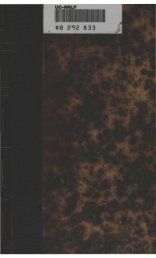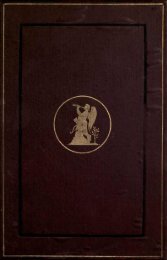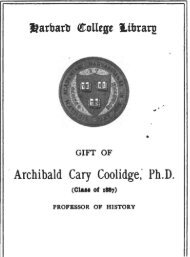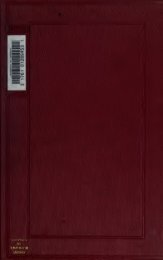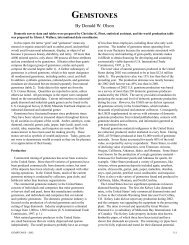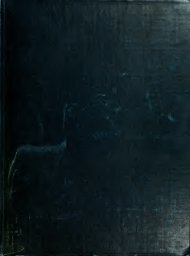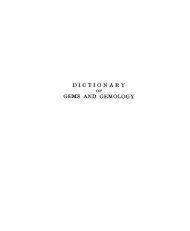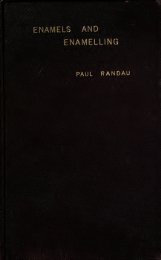- Page 1 and 2:
f; M M : K ^/t:k-,/' > -iALL- Marks
- Page 3:
THE LIBRARY OF THE UNIVERSITY OF CA
- Page 6:
Mr. WilliaiD Chaffers' Works Chaffe
- Page 9 and 10:
HALL MARKS ON GOLD & SILVER PLATE I
- Page 11 and 12:
Opus quale sit, ignis probabit." 1
- Page 13 and 14:
PREFACE TO TENTH EDITION. vii Many
- Page 15 and 16:
PREFACE TO SIXTH EDITION. ix J. H.
- Page 17:
PREFACE TO SIXTH EDITION. xi supply
- Page 20 and 21:
XIV HALL MARKS ON PLATE. Extracts f
- Page 22 and 23:
XVI HALL MARKS ON PLATE. Ireland. c
- Page 25 and 26:
INTRODUCTION. " Money spent in the
- Page 27 and 28:
INTRODUCTION. xxi well-known bas-re
- Page 29 and 30:
INTRODUCTION. xxiii trace of the ol
- Page 31 and 32:
INTRODUCTION. xxv fyll a varyaunce
- Page 33 and 34:
INTRODUCTION. xxvii Coventry were e
- Page 35 and 36:
INTRODUCTION. xxix Again, at the Co
- Page 37 and 38:
INTRODUCTION. xxxi was restored in
- Page 39 and 40:
INTRODUCTION. xxxiii Type F. circa
- Page 41 and 42:
INTRODUCTION. xxxv double roses and
- Page 43 and 44:
INTRODUCTION. xxxvJi The bowl of th
- Page 47 and 48:
INTRODUCTION. xxxix CHRISTENING BOW
- Page 49 and 50:
INTRODUCTION. xli dove on a cross a
- Page 51 and 52:
INTRODUCTION. xliii jurisdiction, b
- Page 53 and 54:
INTRODUCTION. xlv Another of Sir A.
- Page 56 and 57:
Silver Gilt Standing Cup. Date i6og
- Page 58 and 59:
xlviii INTRODUCTION. " This Cupp wa
- Page 60 and 61:
1 INTRODUCTION. in. 1525-6, was giv
- Page 62 and 63:
li INTRODUCTION. arabesque work rou
- Page 64 and 65:
liv INTRODUCTION. ^^ Staniintg Salt
- Page 66 and 67:
Ivi INTRODUCTION. Other examples ha
- Page 68 and 69:
Iviii INTRODUCTION. A candlestick a
- Page 71:
ENGLISH GOLD AND SILVER SMITHS.
- Page 74 and 75: 2 HALL MARKS ON PLATE. but Dunstan
- Page 76 and 77: 4 HALL MARKS ON PLATE. A.D. 849-901
- Page 78 and 79: 6 HALL MARKS ON PLATE. works in the
- Page 80 and 81: 8 HALL MARKS ON PLATE. justices ass
- Page 82 and 83: 10 HALL MARKS ON PLATE. Nicholas de
- Page 84 and 85: 12 HALL MARKS ON PLATE. Hessey, gol
- Page 86 and 87: 14 HALL MARKS ON PLATE. 1403. The f
- Page 88 and 89: i6 HALL MARKS ON PLATE. 1452. Sir H
- Page 90 and 91: 1 8 HALL MARKS ON PLATE. ally allow
- Page 92 and 93: 20 HALL MARKS ON PLATE. 1509. Pielr
- Page 94 and 95: 22 HALL MARKS ON PLATE. at the sign
- Page 96 and 97: 24 HALL MARKS ON PLATE. fifthly, to
- Page 98 and 99: 26 HALL MARKS ON PLATE. In the Gold
- Page 100 and 101: 28 HALL MARKS ON PLATE. 1588-9 and
- Page 102 and 103: 30 HALL MARKS ON PLATE. 1600. Dame
- Page 104 and 105: 32 HALL MARKS ON PLATE. William Jac
- Page 106 and 107: 34 HALL MARKS ON PLATE. i(i^o. Robe
- Page 108 and 109: 36 HALL MARKS ON PLATE. much as ^^2
- Page 110 and 111: 38 HALL MARKS ON PLATE. credit, as
- Page 112 and 113: 40 HALL MARKS ON PLATE. 1670. Josep
- Page 114 and 115: 42 HALL MARKS ON PLATE. John Mawson
- Page 116 and 117: 44 HALL MARKS ON PLATE. London upon
- Page 118 and 119: 46 HALL MARKS ON PLATE. 1690. Georg
- Page 120 and 121: 48 HALL MARKS ON PLATE. in 1722, an
- Page 122 and 123: 50 HALL MARKS ON PLATE. 1701. In 17
- Page 126 and 127: 54 HALL MARKS ON PLATE. short inter
- Page 128 and 129: 56 HALL MARKS ON PLATE. that the fa
- Page 130 and 131: 58 HALL MARKS ON PLATE. 1747. Sir W
- Page 132 and 133: (X) HALL MARKS ON PLATE. 1780. Riin
- Page 134 and 135: 62 HALL MARKS ON PLATE. ISH Crowned
- Page 136 and 137: m^ JKarks on Plate AND TAXATION OF
- Page 138 and 139: 66 HALL MARKS ON PLATE. 1696. 8 and
- Page 140 and 141: 0):tracts from Statutes, rlitranrts
- Page 142 and 143: 70 HALL MARKS ON PLATE. GOLDSMITHS'
- Page 144 and 145: 72 HALL MARKS ON PLATE. In 1359 one
- Page 146 and 147: 74 HALL MARKS ON PLATE. EXPORTS FOR
- Page 148 and 149: 6 HALL MARKS ON PLATE. merit. (3) A
- Page 150 and 151: ;8 HALL MARKS ON PLATE. silver, of
- Page 152 and 153: 8o HALL MARKS ON PLATE. " II. Nor t
- Page 154 and 155: 82 HALL MARKS ON PLATE. all which F
- Page 156 and 157: 84 HALL MARKS ON PLATE. who exercis
- Page 158 and 159: 86 HALL MARKS ON PLATE. or more tha
- Page 160 and 161: 88 HALL MARKS ON PLATE. first two l
- Page 162 and 163: 90 HALL MARKS ON PLATE. Sect. 4. Th
- Page 164 and 165: 92 HALL MARKS ON PLATE. watch cases
- Page 166 and 167: 94 HALL MARKS ON PLATE. Plate shall
- Page 168 and 169: 96 HALL MARKS ON PLATE. Small or Sl
- Page 170 and 171: 9S HALL MARKS ON PLATE. two ounces
- Page 172 and 173: 100 HALL MARKS ON PLATE. By the sam
- Page 174 and 175:
102 HALL MARKS ON PLATE. of Great B
- Page 176 and 177:
104 HALL MARKS ON PLATE. changed, o
- Page 178 and 179:
io6 HALL MARKS ON PLATE. REDUCED ST
- Page 180 and 181:
io8 HALL MARKS ON PLATE. A.D. i8;o.
- Page 182 and 183:
HO HALL MARKS ON PLATE. A.D. 1876.
- Page 184 and 185:
112 HALL MARKS ON PLATE. your Commi
- Page 186 and 187:
114 HALL MARKS ON PLATE. That Parli
- Page 188 and 189:
ii6 HALL MARKS ON PLATE. was wrough
- Page 190 and 191:
QTijt Stauiiarif. The English sterl
- Page 192 and 193:
120 HALL MARKS ON PLATE. The value
- Page 194 and 195:
DATK. 122 HALL MARKS ON PLATE. Tabl
- Page 196 and 197:
124 HALL MARKS ON PLATE. Mr. Freema
- Page 198 and 199:
126 HALL MARKS ON PLATE. its French
- Page 200 and 201:
128 HALL MARKS ON PLATE. 'The Imper
- Page 202 and 203:
no HALL MARKS ON PLATE. ounce troy
- Page 204 and 205:
132 HALL MARKS ON PLATE. The assay
- Page 206 and 207:
134 HALL MARKS ON PLATE. sorts of f
- Page 208 and 209:
136 HALL MARKS ON PLATE. Assayers'
- Page 210 and 211:
138 HALL MARKS ON PLATE. ;63,826 7s
- Page 212 and 213:
140 HALL MARKS ON PLATE, Indian and
- Page 214 and 215:
CJjt lilts- A.D. 17 19. 6 George I.
- Page 216 and 217:
144 HALL MARKS ON PLATE. ished, but
- Page 218 and 219:
146 00 pi w K*^ 00 K < o ^ ^ a: P5S
- Page 220 and 221:
148 HALL MARKS ON PLATE. EXTRACT FR
- Page 222 and 223:
I50 HALL MARKS ON PLATE. The oath t
- Page 224 and 225:
152 HALL MARKS ON PLATE. of manufac
- Page 226 and 227:
154 HALL MARKS ON PLATE. and rules
- Page 228 and 229:
156 HALL MARKS ON PLATE. it must no
- Page 230 and 231:
158 HALL MARKS ON PLATE. " The Gold
- Page 232 and 233:
i6o HALL MARKS ON PLATE. limit were
- Page 235 and 236:
TABLE OF MARKS.
- Page 237 and 238:
Table of Marks used in 1701-2 at th
- Page 239 and 240:
0nglauir, By far the most important
- Page 241 and 242:
shield. THE LEOPARD'S HEAD. 169 Aft
- Page 243 and 244:
lliE STANDARD MARK. 171 Cycles 14 a
- Page 245 and 246:
DUTY MARK 173 In 1896 a new form of
- Page 247:
MARK FOR FOREIGN PLATE. 1/5 Under t
- Page 251 and 252:
CYCLE 1. LOMBABDIC EDWARD IV., RICH
- Page 253 and 254:
FOTJE Marks. 1. Lropard's Hcnd. cr.
- Page 255 and 256:
CYCLE 2 0. LONDON ASSAY OFFICE LETT
- Page 257 and 258:
BATE. CHRONOLOGICAL LIST. 183 cuspc
- Page 259 and 260:
CHRONOLOGICAL LIST. 187 Cycle IV. M
- Page 261 and 262:
CHRONOLOGICAL LIST. 189 1571. 0. 57
- Page 263 and 264:
CHRONOLOGICAL LIST. 191 1594. R. 57
- Page 265 and 266:
CHRONOLOGICAL LIST. 193 1616. T. Di
- Page 267 and 268:
CHRONOLOGICAL LIST. 195 1648. L. Sp
- Page 269 and 270:
CHRONOLOGICAL LIST. 197 1683. f. 58
- Page 271 and 272:
CHRONOLOGICAL LIST. 199 17 1 3. S.
- Page 273 and 274:
CHRONOLOGICAL LIST. 201 1743. h. 59
- Page 275 and 276:
i;;2 1772 1772 ^773 U73 1774 1774 1
- Page 277:
LONDON GOLD AND SILVER SMITHS.
- Page 280 and 281:
208 MAKER'S MARK. W above curved li
- Page 282 and 283:
2IO HALL MARKS ON PLATE. MAKER S MA
- Page 284 and 285:
212 HALL MARKS ON PLATE. maker's -M
- Page 286 and 287:
214 MAKEU S MAKK. R P separated by
- Page 288 and 289:
2l6 HALL MARKS ON PLATE. MAKER S MA
- Page 290 and 291:
2i; HALL MARKS ON PLATE. MAKER S MA
- Page 292 and 293:
220 HALL MARKS ON PLATE. MAKER'S MA
- Page 294 and 295:
222 HALL MARKS ON PLATE. MAKER S MA
- Page 296 and 297:
224 MAKER S MA15K. G G a column bet
- Page 298 and 299:
226 HALL MARKS ON PLATE. MAKER S MA
- Page 300 and 301:
228 HALL MARKS ON PLATE. makeb's ma
- Page 302 and 303:
230 MAKER S MARK. T H above star. I
- Page 304 and 305:
232 maker's mark. Capital letter S
- Page 306 and 307:
234 MAKER S MARK. M ill dotted circ
- Page 308 and 309:
2^6 MAKER S MARK. T I escallop shel
- Page 310 and 311:
238 MAKER S MARK. R I iji dotted ci
- Page 312 and 313:
240 MAKER S MA1!K. DATE. I 8 in mon
- Page 314 and 315:
242 MAKER S MARK. B O with mitre ab
- Page 316 and 317:
244 maker's mark. 1 N 1700 G O crow
- Page 318 and 319:
46 MAKEK S MABK. J a. in shaped shi
- Page 320 and 321:
248 MAKER S M.VHK. S L beneatli glo
- Page 322 and 323:
250 MAKER S MARK. DATE. PL crowned
- Page 324 and 325:
2'>2 MAKEK S MAKK. L O ill monogram
- Page 326 and 327:
'54 MAKER 8 MARK. P E in plain shie
- Page 328 and 329:
256 maker's mark. R B beneath annul
- Page 330 and 331:
2';8 maker's mask. R B script lette
- Page 332 and 333:
26o HALL MARKS ON PLATE. MAKEK S MA
- Page 334 and 335:
262 HALL MARKS ON PLATE. MAKER S MA
- Page 336 and 337:
264 MAKER S 3VURK. I P FW beneath f
- Page 338 and 339:
266 HALL MARKS ON PLATE. MAKER S MA
- Page 340 and 341:
268 HALL MARKS ON PLATE maker's, ma
- Page 342 and 343:
2/0 maker's MABK. HALL MARKS ON PLA
- Page 345:
PROVINCIAL ASSAY OFFICES.
- Page 348 and 349:
2/6 HALL MARKS ON PLATE. BIRMINGHAM
- Page 350 and 351:
2/8 And for silver : HALL MARKS ON
- Page 353 and 354:
BIRMINGHAM ASSAY OFFICE LETTERS.
- Page 355 and 356:
CHESTER ASSAY OFFICE. 283 CHESTER.
- Page 358 and 359:
Chester Assay Office. Old Copper Pl
- Page 360 and 361:
286 HALL MARKS ON PLATE. Chester wa
- Page 362 and 363:
CYCLE 1. Black Lkttkr Capitals. CHA
- Page 364 and 365:
290 CYCLE 11. Roman Capitals. (3 m
- Page 366 and 367:
292 HALL MARKS ON PLATE. we may wit
- Page 368 and 369:
294 HALL MARKS ON PLATE. A brown mo
- Page 370 and 371:
296 HALL MARKS ON PLATE. May 8, 170
- Page 373:
EXETER ASSAY OFFICE LETTERS.
- Page 378 and 379:
304 HALL MARKS ON PLATE. Split head
- Page 380 and 381:
3o6 HALL MARKS ON PLATE. erville. H
- Page 384 and 385:
310 (D HALL MARKS ON PLATE. EXAMPLE
- Page 386 and 387:
312 HALL MARKS ON PLATE. burgesses
- Page 388 and 389:
314 HALL MARKS ON PLATE. able, and
- Page 390 and 391:
3i6 HALL MARKS ON PLATE. The assay
- Page 393 and 394:
m I ra SHEFFIELD ASSAY OFFICE LETTE
- Page 395 and 396:
YORK. 321 of the maker, a half rose
- Page 397 and 398:
Scotlautr. EXTRACTS FROM STATUTES A
- Page 399 and 400:
SCOTLAND. 325 to melt any gold or s
- Page 401 and 402:
SCOTLAND. 327 SALE OF PLATE PROHIBI
- Page 403 and 404:
VIZ. : SCOTLAND. 329 GOLD AND SILVE
- Page 405 and 406:
EDINBURGH. 331 III. THE DATE MARK.
- Page 407:
EDINBURGH ASSAY OFFICE LETTERS.
- Page 411 and 412:
EDINBURGH. 337 The preceding Table
- Page 413 and 414:
EDINBURGH MARKS. 339 i^^ K^DI S HG
- Page 415 and 416:
ell. GLASGOW. 341 2. The Ha
- Page 417:
GLASGOW ASSAY OFFICE LETTERS.
- Page 420 and 421:
346 mm (#) M iMgfOl 7M] fs HALL MAR
- Page 422 and 423:
3^8 iBAl [IAI H rBANFl (D( mm(i) m
- Page 424 and 425:
350 ai^si m HALL MARKS ON PLATE. EX
- Page 426 and 427:
352 HALL MARKS ON PLATE. "Burke's G
- Page 428 and 429:
354 HALL MARKS ON PLATE. DUTY IMPOS
- Page 430 and 431:
356 HALL MARKS ON PLATE. FOREIGN PL
- Page 432 and 433:
358 HALL MARKS ON PLATE. The maker'
- Page 434 and 435:
36o HALL MARKS ON PLATE. III. THE D
- Page 436 and 437:
362 HALL MARKS ON PLATE. The assay
- Page 438:
CYCLE 5. Black Litter Capitals. DUB
- Page 441 and 442:
DUBLIN MARKS. 367 EXAMPLES. Two Tan
- Page 443 and 444:
LIST OF IRISH PLATE. 369 DATE. MAKE
- Page 445:
DATE. LIST OF IRISH PLATE. 371
- Page 448 and 449:
374 HALL MARKS ON PLATE. AUTHORITIE
- Page 450 and 451:
3;6 HALL MARKS ON PLATE. CRIPPS, W.
- Page 452 and 453:
3;8 Gardner, J. Starkie. HALL MARKS
- Page 454 and 455:
38o HALL MARKS ON PLATE. LUTHMER, F
- Page 456 and 457:
382 HALL MARKS ON PLATE. Redman, W.
- Page 459 and 460:
A, mark, 209, 218, 228, 237. A B ma
- Page 461 and 462:
Cameron, , goldsmith, 348. Campbell
- Page 463 and 464:
Fox, J., goldsmith, 28. , M., golds
- Page 465 and 466:
L, mark, 269. LA, mark, 244-6, 252,
- Page 467 and 468:
Reade, Sir B., goldsmith, 19. , J.,
- Page 469:
AVard, J., goldsmith, 242. , R., go
- Page 474 and 475:
Thirteenth Edition, entirely re-set
- Page 476 and 477:
4 Handsome Library Edition. 4 Vols.
- Page 478 and 479:
MR. WILLIAM CHAFFERS' WORKS. ChafiE
- Page 480:
8 Investigation into the Cause o! t
- Page 484:
if { 'r^^-T^



